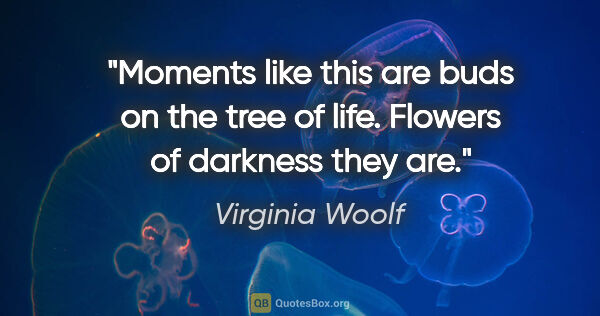Bud Quotes (page 2)
Between the dark, heavily laden treetops of the spreading chestnut trees could be seen the dark blue of the sky, full of stars, all solemn and golden, which extended their radiance unconcernedly into the distance. That was the nature of the stars. and the trees bore their buds and blossoms and scars for everyone to see, and whether it signified pleasure or pain, they accepted the strong will to live. flies that lived only for a day swarmed toward their death. every life had its radiance and...
Herman Hesse
Who will consider that no dictionary of a living tongue ever can be perfect, since, while it is hastening to publication, some words are budding, and some falling away; that a whole life cannot be spent upon syntax and etymology, and that even a whole life would not be sufficient; that he, whose design includes whatever language can express, must often speak of what he does not understand.
Samuel Johnson
...burying the bush in these little rosettes, almost too ravishing in colour, this rustic 'pompadour'. High up on the branches, like so many of those tiny rose-trees, their pots .concealed in jackets of paper lace, whose slender stems rise in a forest from the altar of the greater festivals, a thousand buds were swelling and opening, paler in colour, but each disclosing as it burst, as at the bottom of a cup of pink marble, its blood-red stain...
Marcel Proust
The lord of distant archery, Apollo, answered: "Lord of earthquake, sound of mindyou could not call me if I strove with youfor the sake of mortals, poor things that they are. Ephemeral as the flamelike budding leaves, men flourish on the ripe wheat of the grainland, then in spiritless age they waste and die.
Homer
Wherever in this city, screens flickerwith pornography, with science-fiction vampires, victimized hirelings bending to the lash, we also have to walk . . . if simply as we walkthrough the rainsoaked garbage, the tabloid crueltiesof our own neighborhoods. We need to grasp our lives inseperablefrom those rancid dreams, that blurt of metal, those disgraces, and the red begonia perilously flashingfrom a tenement sill six stories high, or the long-legged young girls playing ballin the junior...
Adrienne Rich
The trees are coming into leaf. Like something almost being said; The recent buds relax and spread, Their greenness is a kind of grief. Is it that they are born again. And we grow old? No, they die too. Their yearly trick of looking new. Is written down in rings of grain. Yet still the unresting castles thresh. In fullgrown thickness every May. Last year is dead, they seem to say, Begin afresh, afresh, afresh.
Philip Larkin
Don't suggest that we are growing old, my Lord. We have only bloomed; and a very nice bouquet we make with our buds about us,' answered Mrs. Amy, shaking out the folds of her rosy muslin with much the air of dainty satisfaction the girl used to show in a new dress. Not to mention our thorns and dead leaves,' added Jo, with a sigh; for life had never been very easy to her, and even now she had her troubles both within and without.
Louisa May Alcott
Fairy Song
Shed no tear! oh, shed no tear!
The flower will bloom another year.
Weep no more! oh, weep no more!
Young buds sleep in the root’s white core.
Dry your eyes! oh, dry your eyes!
For I was taught in Paradise
To ease my breast of melodies,—
Shed no tear.
Overhead! look overhead!
‘Mong the blossoms white and red—
Look up, look up! I flutter now
On this fresh pomegranate bough.
See me! ’tis this silvery bill
Ever cures the good man’s ill.
Shed no tear! oh,...
John Keats
The bud disappears when the blossom breaks through, and we might say that the former is refuted by the latter; in the same way when the fruit comes, the blossom may be explained to be a false form of the plant’s existence, for the fruit appears as its true nature in place of the blossom. The ceaseless activity of their own inherent nature makes these stages moments of an organic unity, where they not merely do not contradict one another, but where one is as necessary as the other; and...
Georg Wilhelm Friedrich Hegel

